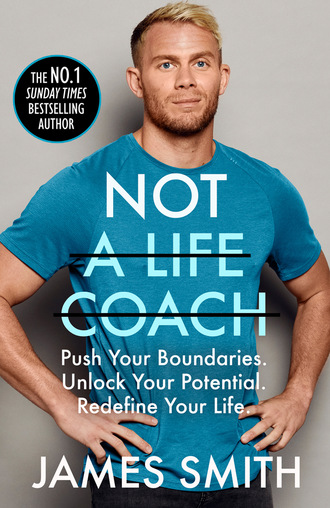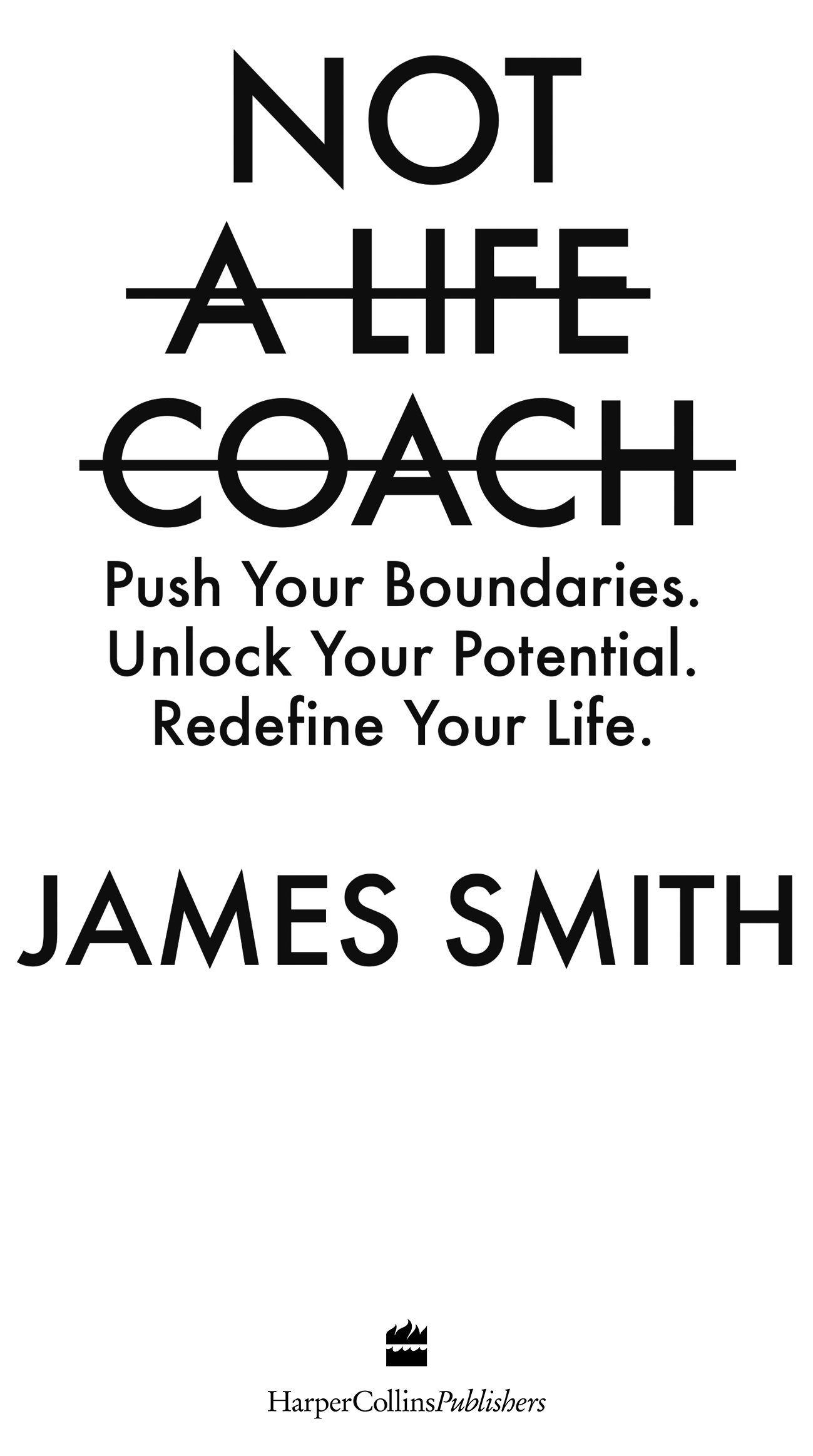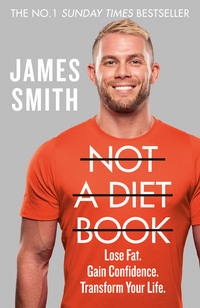
Полная версия
Not a Life Coach


Copyright
Extracts from Outliers by Malcolm Gladwell. Copyright © 2008 published by Little, Brown and Company 2008, Allen Lane 2008, Penguin Books 2009. Reproduced by permission of Penguin Books Ltd.
Extract from The Story of Philosophy by Will Durant. Reproduced by permission of SSA, a division of Simon & Schuster, Inc. Copyright © Will Durant, 1961.
Extract from Sapiens by Yuval Noah Harari. Copyright© 2015 by Yuval Noah Harari. Courtesy of HarperCollins Publishers.
Extracts from The 4-Hour Workweek: Escape The 9-5, Live Anywhere, And Join The New Rich by Timothy Ferriss. Copyright © 2007, 2009 by Carmenere One, LLC. Used by permission of Crown Books, an imprint of Random House, a division of Penguin Random House LLC. All rights reserved.
Extract from Start With Why: How Great Leaders Inspire Everyone to Take Action by Simon Sinek. Copyright © 2009 by Simon Sinek. Reproduced by permission of Penguin Books Ltd. © and by permission of Portfolio, an imprint of Penguin Publishing Group, a division of Penguin Random House LLC. All rights reserved.
While every effort has been made to trace the owners of copyright material reproduced herein and secure permissions, the publishers would like to apologise for any omissions and will be pleased to incorporate missing acknowledgements in any future edition of this book
HarperCollinsPublishers
1 London Bridge Street
London SE1 9GF
www.harpercollins.co.uk
First published by HarperCollinsPublishers 2020
FIRST EDITION
Text © James Smith 2020
Cover layout design © HarperCollinsPublishers 2020
Cover photograph © Steve Baccon 2020
A catalogue record of this book is available from the British Library
James Smith asserts the moral right to be identified as the author of this work
All rights reserved under International and Pan-American Copyright Conventions. By payment of the required fees, you have been granted the nonexclusive, non-transferable right to access and read the text of this e-book on screen. No part of this text may be reproduced, transmitted, downloaded, decompiled, reverse engineered, or stored in or introduced into any information storage retrieval system, in any form or by any means, whether electronic or mechanical, now known or hereinafter invented, without the express written permission of HarperCollins e-books.
Find out about HarperCollins and the environment at
www.harpercollins.co.uk/green
Source ISBN: 9780008404840
Ebook Edition © November 2020 ISBN: 9780008404826
Version: 2020-10-22
While the author(s) of this work have made every effort to ensure that the information contained in this book is as accurate and up-to-date as possible at the time of publication, medical and pharmaceutical knowledge is constantly changing and the application of it to particular circumstances depends on many factors. Therefore it is recommended that readers always consult a qualified medical specialist for individual advice. This book should not be used as an alternative to seeking specialist medical advice which should be sought before any action is taken. The author(s) and publishers cannot be held responsible for any errors and omissions that may be found in the text, or any actions that may be taken by a reader as a result of any reliance on the information contained in the text which is taken entirely at the reader's own risk.
Note to Readers
This ebook contains the following accessibility features which, if supported by your device, can be accessed via your ereader/accessibility settings:
Change of font size and line height
Change of background and font colours
Change of font
Change justification
Text to speech
Page numbers taken from the following print edition: ISBN 9780008404840
Contents
1 Cover
2 Title Page
3 Copyright
4 Note to Readers
5 Contents
6 Preface
7 Introduction
8 PART I: ENVIRONMENT
9 The Essentials
10 ‘Wealth’: Real Wealth Versus Money in the Bank
11 Communication: How to Talk to Yourself and Others
12 PART II: VALUES
13 Values of Success: So, What If It All Goes Wrong?
14 Sunk Cost Fallacy Revisited
15 The Power of the Anomaly
16 Individual Values
17 Time
18 Meditation
19 PART III: FOUNDATIONS
20 Mindset
21 Limiting Beliefs
22 Fear of Failure, Fear of Success
23 Motivation
24 The Confidence Paradox
25 PART IV: IDENTITY
26 Perception
27 Identification and Implementation
28 Success, Conversions and Satisfaction
29 ‘Wealth’ 2.0
30 PART V: COMFORT ZONES AND ESCAPISM
31 A Brief Introduction to Physics (and Getting to Know Your Comfort Zone)
32 Escapism
33 Priorities
34 Future Anxiety
35 Dating
36 Regression to the Mean
37 Real-Life Learning
38 Reversing Emotions and Bias
39 Why?
40 Making it Real
41 Newton’s Laws
42 Not the Final Chapter
43 References
44 Acknowledgements
45 Index
46 By the same author
47 If You Enjoyed the Book
48 About the Publisher
LandmarksCoverFrontmatterStart of ContentBackmatter
List of Pagesiiiivixxxixiiixivxvxvixviixviiixixxx13456789101112131415161718192021232425262728293031323334353739404142434445464749505152535455565758596061626364656667686970717273757778798081828384858687888990919293949596979899100101102103104105106107108109110111112113114115116117118119120121122123124125126127128129131133134135136137138139140141143144145146147148149151152153154155156157158159160161162163164165166167168169171172173174175176177178179181183185186187188189191192193195196197198199200201202203204205206207208209210211213214215216217218219220221222223224225226227228229230231233234235236237238239240241243244245246247249250251252253254255256257259260261262263264265266
Preface
If someone had asked me when I was twenty-one to write a book that could change lives, I wouldn’t have considered myself able to change even one person’s life for the better, or offer any advice of true value. But here we are, ten years on, and I’ve found myself doing exactly that – and doing it as a career. In a relatively short space of time, I have gained valuable perspective, experience and evidence that go beyond assumption and are void of unconscious bias, all to provide you with the opportunity to change the way you think. Let’s put it this way: for the last decade, often without even realizing it, I’ve been preparing for this very moment, for you to pick up this book and read this very page.
In my first book, I delved into how to fix insecurities, physical issues and imbalance from the neck down; here, I look at all that exists from the neck up. I know what you are probably thinking right now: who the hell am I to give you advice? What puts me in a position of authority on these topics? I ask myself the same question most days, to be honest, and have thought to myself while writing each and every chapter: why should people listen to me?
I’m not trying to be an expert on life. I am not your leader, and I’m not asking you to follow me. I am not, nor can I be, irrefutably correct on every opinion I have. I am, like you and like everyone you know, only human.
The popular Greek proverb states that ‘old men plant trees whose shade they know they shall never sit in’. When it comes to the art of true stoicism and many long-held discussions of philosophy, I often sit back and wonder whether it’s all just a trail of people leaving advice they wish their younger selves could hear.
I wasted years of my life frustrated, deflated, disheartened and annoyed in the wrong job, chasing the wrong goals, eventually becoming the personal trainer that I wish had been there for me when I needed him. Now, I hope that I can be the coach I wish had been there when I was sleepwalking through my own life, held back by believing my own potential was limited.
Only you can take the reins of your own life and choose to make a change, but I can be the one to give you the tools to do so. This book is quite simply the book I wish had been there for me at crucial turning points of my life.
If you stop to look around and think about it, you will see there is an invisible blueprint to life that the majority of the world is following, and I can’t help but think it’s leaving so many people unfulfilled, unhappy and dissatisfied. Many seek and accomplish financial ‘freedom’, but it’s to no avail when there is no sense of purpose. This book, I hope, will provoke necessary change; it will begin from the turn of the next page, but it won’t finish with the turn of the last.
Where you’ll be standing, who with, what you’ll be doing and what you’ll achieve are all going to be based on what you read and what you don’t, who you keep in your life and those you let go. In the words of the author Charlie ‘Tremendous’ Jones: ‘You will be the same person in five years as you are today except for the people you meet and the books you read.’
To leave chapters of this book unread will increase the chances that you will leave chapters of your life unlived and, without being unlocked, your potential could be limited, your growth stunted and your self-worth and everyday happiness could suffer.
This is not an ornament for your window ledge – it is not just a book you plan to read, a collation of motivating quotes or parables to live by; this is a lens through which to view the world, so that you can clearly see your underlying potential in the context of a spectrum that you couldn’t see clearly before.
I am not your life coach. I am here with one sole purpose: to change your life.
So let’s begin.
James
Introduction
What if I told you that by the time you finish this book perhaps nothing will have changed? Pretty uninspiring, right? You may be a few days older, maybe a few weeks. I don’t know your reading speed or commitment to what I have to say. But ultimately things will be the same. Your phone will lose reception where it usually does, you’ll still be daydreaming about that item of clothing you’ve been thinking about buying for the last few weeks and I expect you’ll probably be using the same tube of toothpaste you are right now when you get to the end of this book. Riveting already, isn’t it?
On a physical basis, you’ll weigh about the same and have the same hairstyle. You’ll also probably have the same job and day-to-day routine. And that very individual way you dry yourself with the towel when you get out the shower? All unchanged. However, these are not the metrics by which I want you to understand change if you commit to reading the next 275 pages. The changes I’m talking about could be so significant that you won’t recognize the person you were just a short time ago. Not necessarily from the outside, maybe not even in the eyes of close family and friends, but in how you begin to realize and perceive certain things about your life.
Stop, take a look around, and you’ll notice that everyone is climbing the ladder of life to see who can get to the highest rung. However, I don’t see many people taking a moment to really think whether they’re climbing the right ladder. It doesn’t matter how high you climb it if, when you get to the top, you realize you’ve climbed the wrong one. It doesn’t matter how fast you’re going if you’re not going in the right direction.
But if everyone else is doing it, how come I’m telling you you’re wrong to do the same? Let’s flip that for a second: am I saying you’re wrong with your choices or am I alluding to the fact that your choices aren’t 100 per cent right? And when I say ‘right’, I mean that if we were to sit down and look at what you want to do with your life and what you’re currently doing with it, I think we could find some pretty blatant discrepancies. You’d probably offer excuses like, ‘Now isn’t a good time’ or, ‘If I had more financial freedom.’ But I’m afraid the universe will not align with you and the seas will not part to create an easy path for you. That’s life.
I’ve often said, ‘If a million people believe something stupid, it’s still stupid.’ Humans are brilliant at telling themselves stories, like the elaborate ones about what happens when we die – some people are more concerned with the afterlife than their existing one. (That’s not a dig at religion, but an example to consider in the wider context: if someone wanted you to buy shares, you’d want something tangible to back up their claims, wouldn’t you? Just because someone else believes in it doesn’t mean you should as well.)
I know what you’re thinking – we’re only human, right? Well, what does that even mean? Let’s look at what being human is, because if there’s one thing you need to know about human beings, it’s that we’re inherently dishonest. We lie and we can’t help it. And this isn’t exclusive to just us Homo sapiens, either. If we look across the animal kingdom, we can see it’s prevalent among primates and all kinds of other species that barely resemble humans at all.
Not telling the truth isn’t always a bad thing, though. Consider a knife, say: it’s really about what you choose to do with it – you could harm someone or you could just butter their toast. Well, it’s the same with a lie. And the reason I even mention this so early on in the book is this: you’re feeding yourself lies – the harmful kind – on an ongoing basis, and that’s not even the worst part of it, either. Want to know what’s worse? You’re believing them and therefore unaware of the harm they’re causing, and it’s having a profound impact on not just how you feel, but who you are and how you see yourself on a daily basis. Now, it’s worth mentioning that harm in this context is deliberately inflicted by yourself on yourself; it’s not a wound that’s visible like a cut, but instead it is a set of limiting beliefs, poor values and the inability to back yourself to your full potential on days of the week that end in ‘y’.
From this introduction to the last chapter of this book and everything in between you can become a completely transformed person with a new approach, mindset and entirely different beliefs to the person who is about to turn this page right now – but I need your full attention for just a handful of hours.
Now put this book down for a second, look around and tell me what you see. Most things you’ll tend to see are governed by money, greed, quick hits of dopamine, instant gratification and calories. The problem with this is that we’re told these things will make us happy. But I see money and calories as just the top of the list of currencies crippling the world’s self-esteem.
Money, that’s easy – you can buy the biggest yacht in the world, but one day you’ll see a bigger one next to yours in the marina. There’s a reason they say that the two best days of your life when you own a yacht are the day you buy it and the day you sell it. We’re made to feel inadequate and that our lives should be governed by doing ‘the right thing’, such as buying a house or prioritizing how our CVs look, rather than travelling, taking risks or, most importantly, just enjoying it the best we can before the lights go out.
Then there are calories, hedonic foods, indulgences and gluttony for those who perhaps have issues like underlying unhappiness – that is why I wrote Not a Diet Book. I wanted to bring clarity to the concept of how all diets work the same way and that ultimately adherence and sustainability are at the nucleus of successful fat-loss regimes.
With this book I wanted to move away from calories and fitness and instead challenge your mindset, ethos and attitudes outside of that realm of your life to align you with a new way of thinking. Especially in the context of a largely nuanced and subjective word that, no matter what we say, we all crave and seek, sometimes without even knowing it: success.
Why is it that our younger, more adventurous, risk-taking inner child became so derailed from what they instinctively loved doing? Why have so many of us become dead set on seeing who can die with the most money? Why do we lie to ourselves about what we wish to accomplish or prioritize things in the way that we do? Why do we want people to follow us on social media, and take it so personally when they unfollow us? (Which, if you think about it, is merely to opt out of wanting to see what we’re posting and sharing each day, hardly the stab in the gut it can feel like.)
We are so wrong about what success is, so many of us quite simply not being happy no matter what. We have more at our fingertips than we’ve ever had before, yet we struggle to feel happy about it. And we have days when we feel deflated and unmotivated despite the fact that, by comparison (which I’ll come on to later), we have it so much better than others. Why?
Why do we quantify our self-worth with finances, materialistic purchases and how much it’s possible to get laid, only to end up often overlooking the good life that has been in front of us the entire time?
And why are we blindly led to the blueprint for life by people who have spent a lifetime lying to themselves? It’s like the blind leading the blind on how to pay taxes and then die.
The world becomes safer and an easier place in which to live. I know a lot of people don’t believe this since COVID-19, but it’s important to remember that couples used to, on average, have five to six children due to the fact that it was unlikely many would reach adulthood. Although (at the time of writing) there is an impending economic gloom for many, we still have access to doctors, antibiotics, state support and education. People think the world is getting worse, but it’s getting better, I assure you. We’ve only had warm showers for around 150 years; no one even knew what a warm shower was before then. So, if you can be a pragmatist for a second, take your mind off the tabloid headlines and you’ll see that the world continues to improve. Yet at the same time, the rates for people deciding to prematurely hit the eject button on their life continues to rise. Are we fucked or are we, perhaps, just idealizing the wrong things?
It worries me to see the number of people who are anxious, emotionally crippled, insecure and unhappy, while simultaneously being given the tools to mask their real feelings with a triple tap on a laughing-face emoji in the group chat. The systems in which we live, our methods of communication and what we’re exposed to on social media all impact how we feel about ourselves, our place in the world, our purpose and our happiness. But are we truly broken or do we simply need to rethink our perceptions on elements of our lives that we have perceived incorrectly before?
I once thought I was lucky with my state of mental health. I even declared myself as someone who ‘didn’t suffer’ with mental-health issues. I have since found that isn’t the case at all; I was just much more proactive than I ever realized at protecting my state of mind, my ‘mental wealth’. I am going to share a lot with you over the coming chapters about how you can protect yours too.
Let’s say you’re injured – do you know a physio? Toothache – you see a dentist. But do you know where to go when you’re struggling with mental health – a person, a place or an organization that can help? Because you should. Athletes are proactive with avoiding injuries when possible, but they do happen; the same proactive approach should be taken with mental health – just like a check-up at the dentist. To spot things before they cause us too much pain. What could the possible negative implications be on proactively making contact with someone who could help you? You may not need them now, but in the future, it’s better to have the person and not need them than vice versa. Look at the military, for instance – on standby at all times, usually at a cost of billions to taxpayers. An essential pre-emptive resource so that if things go bad, we’re ready. If you’re an athlete and your performance is of the utmost importance to you, it is worth getting even the slightest niggle looked at before it potentially gets worse. You’ll come back from a muscle strain, but not everyone is coming back from their mental-health ‘niggles’, thus the importance of staying on top of mental health even before you think you might ‘need’ to.
But before we begin, let us be real with each other. This book can, if necessary, be read in a day. I know that; you know that. I’m asking for a day of your life (or maybe the evenings of one week or the lunch breaks of a fortnight), and in return, I am laying bare what could be the very notions to connect the dots in what will make you happier long-term.
You don’t need a six-pack to be loved or taken seriously; you don’t need to worry about how your CV looks to those who love you – or to a complete stranger, for that matter. You don’t need to die with the most money in your bank account, because there are no shops in heaven. You just need to really understand success and happiness within the sphere of your own ambitions.
Objectively speaking, we need water, food, sunlight and somewhere to sleep each night to live our lives. But the rest of what we call ‘life’ is subjective; it’s governed by our tastes, our feelings and our opinions. Don’t forget that. Life is only influenced by your thoughts; your existing beliefs are tainted by a bullshit blueprint and it’s time to rewrite your own. What’s more, there are no rules to writing it, and when you do, you will experience empowerment like you’ve never felt before.
I know what you’re thinking: I am happy, though. I am good, though.
What did I tell you about humans having that tendency to be dishonest? The worst bit is, I bet you even believe your thoughts that countered mine in the first place. But I’m not saying you’re an unhappy person, just that you haven’t even scratched the surface of your potential, self-determined success or happiness.
Right now, let me tell you this: you’re currently living in the part of your life you used to look forward to the most and I bet you don’t ever, for a second, give that enough thought to fully realize it, do you?
Social media drives self-esteem down, materialism up, self-worth into the floor and consumerism to the sky. You’re a piece in someone else’s board game and you don’t realize it. You’re not just lying to yourself but being lied to by society as a whole. People work too hard for money they don’t need to buy non-essential things to impress people they don’t like. The world remains full of people fucking exhausted and hungry in a bid to be in such good shape they could belong on the front cover of a magazine, while the bottom line is that … no one who truly matters really cares how much fat you’re carrying as long as you’re healthy, active and you have good banter. (I’m living proof of that.)



